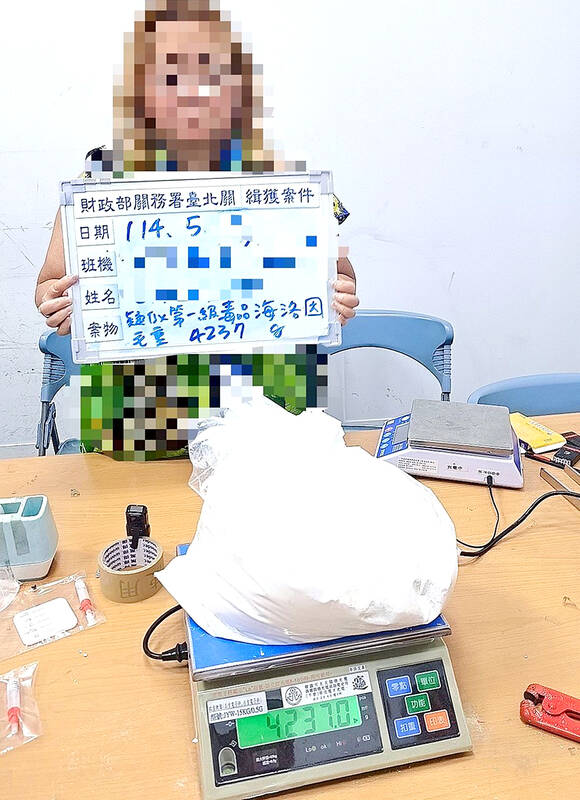An American woman has been indicted for allegedly smuggling heroin from Laos at the request of a man she believed to be the superior of her online fiance, whom she had never met in person, the Aviation Police Bureau said yesterday.
A Taiwanese man assigned to collect the drugs was also arrested, the bureau said.
Customs officers at Taiwan Taoyuan International Airport discovered 4.237kg of heroin hidden in her luggage in May, worth an estimated NT$30 million (US$997,838), Chen Po-chuan (陳博全), captain of the bureau’s Second Investigation Team, said in a joint media interview.

Photo courtesy of the Aviation Police Bureau
The woman was transferred to the Taoyuan District Prosecutors’ Office on charges of contravening the Narcotics Hazard Prevention Act (毒品危害防制條例), Chen said.
The woman, who is about 50 years old, flew from the US to Laos, where she obtained the suitcase containing the heroin before traveling to Taiwan via Hong Kong, he said.
She told investigators she met her fiance online, but never in person, and after learning he was in jail, she was contacted by someone claiming to be his superior.
They allegedly pressured her to send remittances to the fiance, and later offered her a “job” in Laos, covering all expenses and providing daily allowances of several thousand Taiwan dollars.
The woman was eventually instructed to carry the suitcase to Taiwan, although she denied knowing drugs were concealed inside, Chen said.
The aviation police dismissed her claims, citing her inability to identify the man or explain his role, as well as the disproportionate rewards offered for the supposed job, and she was arrested on the spot, he said.
Investigators later apprehended a man surnamed Yeh (葉) in Taoyuan’s Jhongli District (中壢) who insisted he was only picking up the luggage for a friend.
Prosecutors suspect both were acting under the direction of a trafficking ring and indicted them earlier this month.

The manufacture of the remaining 28 M1A2T Abrams tanks Taiwan purchased from the US has recently been completed, and they are expected to be delivered within the next one to two months, a source said yesterday. The Ministry of National Defense is arranging cargo ships to transport the tanks to Taiwan as soon as possible, said the source, who is familiar with the matter. The estimated arrival time ranges from late this month to early next month, the source said. The 28 Abrams tanks make up the third and final batch of a total of 108 tanks, valued at about NT$40.5 billion

Two Taiwanese prosecutors were questioned by Chinese security personnel at their hotel during a trip to China’s Henan Province this month, the Mainland Affairs Council (MAC) said yesterday. The officers had personal information on the prosecutors, including “when they were assigned to their posts, their work locations and job titles,” MAC Deputy Minister and spokesman Liang Wen-chieh (梁文傑) said. On top of asking about their agencies and positions, the officers also questioned the prosecutors about the Cross-Strait Joint Crime-Fighting and Judicial Mutual Assistance Agreement, a pact that serves as the framework for Taiwan-China cooperation on combating crime and providing judicial assistance, Liang

A group from the Taiwanese Designers in Australia association yesterday represented Taiwan at the Midsumma Pride March in Melbourne. The march, held in the St. Kilda suburb, is the city’s largest LGBTQIA+ parade and the flagship event of the annual Midsumma Festival. It attracted more than 45,000 spectators who supported the 400 groups and 10,000 marchers that participated this year, the association said. Taiwanese Designers said they organized a team to march for Taiwan this year, joining politicians, government agencies, professionals and community organizations in showing support for LGBTQIA+ people and diverse communities. As the first country in Asia to legalize same-sex

MOTIVES QUESTIONED The PLA considers Xi’s policies toward Taiwan to be driven by personal considerations rather than military assessment, the Epoch Times reports Chinese President Xi Jinping’s (習近平) latest purge of the Chinese People’s Liberation Army (PLA) leadership might have been prompted by the military’s opposition to plans of invading Taiwan, the Epoch Times said. The Chinese military opposes waging war against Taiwan by a large consensus, putting it at odds with Xi’s vision, the Falun Gong-affiliated daily said in a report on Thursday, citing anonymous sources with insight into the PLA’s inner workings. The opposition is not the opinion of a few generals, but a widely shared view among the PLA cadre, the Epoch Times cited them as saying. “Chinese forces know full well that